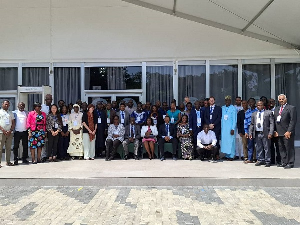Agricultural research experts and stakeholders from across Africa have met in Accra to discuss new approaches to collecting agricultural research data to boost national agricultural research systems.
The Agricultural Sciences and Technology Indicators (ASTI) Regional Workshop opened in Accra.
The workshop formed part of measures by the Food and Agriculture Organisation (FAO) and its regional partners to create awareness about the ASTI and support long-term institutionalisation of the data collection instrument by countries.
The ASTI is a programme that provides open-source data on agricultural research systems in developing countries.
The data is used by policymakers, research managers, donor organisations, and other stakeholders to assess the impact and performance of agricultural research, set priorities for investment and policy, and promote the recruitment and promotion of women in agricultural research.
In the next three days, the participants, drawn from 17 national agricultural research institutions in Africa, will discuss and agree on the work plan for implementing the ASTI data collection in each country, including a series of activities to be carried out during the in-country data collection.
Hernán Daniel Muñoz, ASTI Project Leader at the FAO, said the regional workshop would provide stakeholders with technical insights on the ASTI methodology and introduce new approaches to the researchers.
He said the participants would also discuss ways to leverage lessons learned from the pilots to deepen dialogues among national and regional stakeholders and promote national ownership of the programme.
“We want to find the best model to collect data because all countries have different settings and data collected in the past adopted one single approach not in an official manner.
“We expect to build in each country a national plan on how to implement the model according to the institutional settings and the capacity of the country and the relevance of the agricultural sector research,” Muñoz said.
Dr. Emmanuel Njukwe, Director of Research and Innovation, West and Central African Council for Agricultural Research and Development (CORAF), said the outcome of the workshop would inform policy on agriculture information to guide planning for the sector.
He said data collection in the region was complex due to the different Ministries and Agencies that undertake agricultural research data collection, making it difficult to institutionalise specific research models.
“Human capacity is also a challenge. Some people are trained but are not working in specific specific fields where they were trained. The programme will address those challenges by encouraging specialisation,” he said.
Dr. Wilhemina Quaye, Director, Council for Scientific and Industrial Research -Science and Technology Policy Research Institute, said the Council was working closely with the Ministry of Agriculture to provide relevant data to farmers to improve their productivity.
She expressed confidence that the discussions at the meeting would help to ensure efficient data collection and delivery to stakeholders in the agriculture value chain.
Business News of Wednesday, 27 November 2024
Source: GNA













